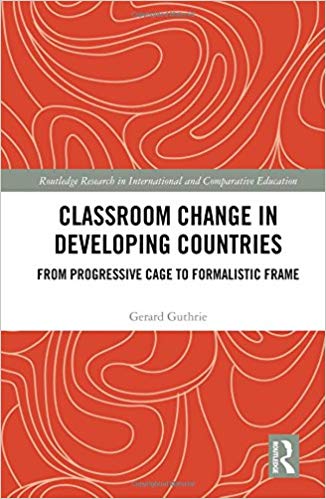Progressive Education, derived mainly from Anglo-American culture, has been the primary frame of reference for student-centered classroom change in developing countries for over 50 years. Yet in many developing countries, strong evidence shows that progressivism has not replaced teacher-centered formalistic classroom practice. Classroom Change in Developing Countries: From Progressive Cage to Formalistic Frame presents a robust case for why formalism should be the primary frame of reference for upgrading classroom teaching in developing countries. Theoretically rich yet grounded in practice, the book draws on case studies from Africa, China and Papua New Guinea to show how culturally intuitive formalistic teaching styles can induce positive classroom change.
Synthesising research and evaluation literature on classroom change in developing countries, Guthrie examines some of the methodological flaws in the literature. The book considers the progressive cage, and looks at Confucian influences on teaching in China, progressive reform failures in both Sub-Saharan Africa and Papua New Guinea, as well as offering a critical take on some failings in comparative education. It examines the formalistic frame, addresses methodological issues in culturally grounded research and offers a model of teaching styles for basic classroom research. The book concludes by returning the focus back to teachers and considers the so-called teacher resistance to change.
The book will be an essential purchase for academics and research students engaged in the fields of classroom teaching, teacher education and curriculum and will also be of interest to academics, aid officials, and decision-makers in developing countries.
چکیده فارسی
آموزش پیشرو، که عمدتاً از فرهنگ انگلیسی-آمریکایی نشأت میگیرد، برای بیش از 50 سال، چارچوب اصلی تغییر کلاس درس دانشآموز محور در کشورهای در حال توسعه بوده است. با این حال، در بسیاری از کشورهای در حال توسعه، شواهد قوی نشان می دهد که ترقی گرایی جایگزین شیوه کلاسی فرمالیستی معلم محور نشده است. تغییر کلاس درس در کشورهای در حال توسعه: از قفس پیشرو تا چارچوب فرمالیستی دلیل محکمی برای این که چرا فرمالیسم باید چارچوب مرجع اولیه برای ارتقای آموزش کلاس درس در کشورهای در حال توسعه باشد، ارائه می دهد. این کتاب از لحاظ نظری غنی و در عین حال مبتنی بر عمل است، از مطالعات موردی آفریقا، چین و پاپوآ گینه نو استفاده میکند تا نشان دهد که چگونه سبکهای آموزشی فرمالیستی شهودی فرهنگی میتوانند باعث تغییر مثبت کلاس درس شوند.
گاتری با ترکیب ادبیات تحقیق و ارزشیابی در مورد تغییر کلاس درس در کشورهای در حال توسعه، برخی از ایرادات روش شناختی در ادبیات را بررسی می کند. این کتاب قفس مترقی را در نظر میگیرد و به تأثیرات کنفوسیوسی بر تدریس در چین، شکستهای اصلاحات پیشرونده در آفریقای جنوب صحرا و پاپوآ گینه نو نگاه میکند، و همچنین دیدگاهی انتقادی در مورد برخی نارساییها در آموزش تطبیقی ارائه میکند. این چارچوب فرمالیستی را بررسی میکند، به مسائل روششناختی در تحقیقات مبتنی بر فرهنگی میپردازد و مدلی از سبکهای تدریس را برای تحقیقات پایه کلاس درس ارائه میدهد. این کتاب با بازگرداندن تمرکز به معلمان به پایان می رسد و به اصطلاح مقاومت معلم در برابر تغییر را در نظر می گیرد.
این کتاب یک خرید ضروری برای دانشگاهیان و دانشآموزان پژوهشی است که در زمینههای تدریس کلاسی، آموزش معلمان و برنامه درسی مشغول به کار هستند و همچنین مورد توجه دانشگاهیان، مقامات کمکرسان و تصمیمگیرندگان در کشورهای در حال توسعه خواهد بود.
>
ادامه ...
بستن ...
Ebook details:
عنوان: Classroom Change in Developing Countries: From Progressive Cage to Formalistic Frame (Routledge Research in International and Comparative Education)
نویسنده: Gerard Guthrie
ناشر: Routledge; 1 edition (March 5, 2018)
زبان: English
شابک: 081535519X, 978-0815355199
حجم: 2 Mb
فرمت: True Pdf
ادامه ...
بستن ...










